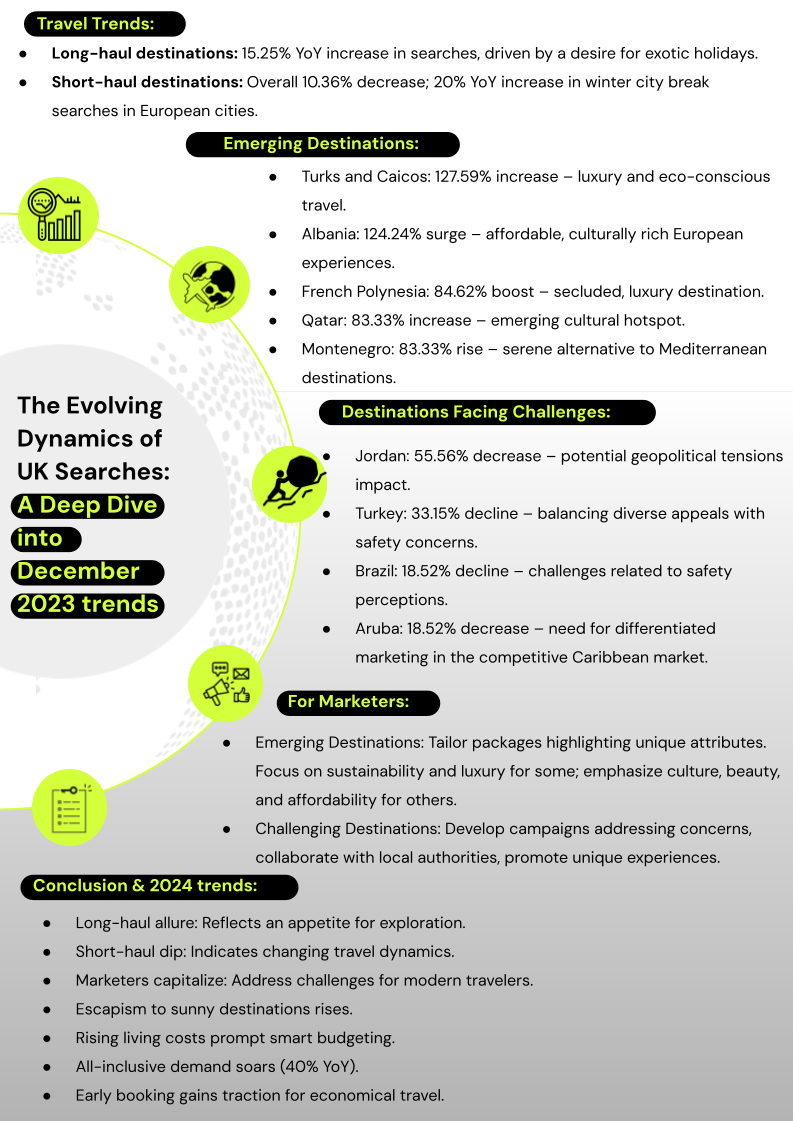Travel Search Pulse: December 2023
The travel industry is witnessing a transformative shift, as evidenced by the latest analysis of Google search trends in the UK. Comparing data from December 2022 and December 2023, we uncover a fascinating narrative of changing travel preferences. This article explores the overall search trends, the dichotomy between long-haul and short-haul travel, and highlights specific destinations soaring in popularity or experiencing a decline.
Snapshot
In December, search volumes for essential travel-related terms such as 'flights', 'hotels', and 'holidays' maintained a steady pace, mirroring the figures from the previous year. However, a significant uptick was observed in queries including the term 'cheap', which saw a 22% Year-over-Year increase, particularly for “cheap holidays”. This trend, coupled with the rising demand for "all-inclusive" options, is in line with the prevailing economic conditions and consumer behaviour patterns. Consumers remain acutely cost-conscious and travel brands are being invited to pivot to budget-friendly and value for money orientated messaging to gain market share.
Long-Haul Escapes : Long-haul destinations witnessed a 15.25% YOY increase in searches during December, signalling a growing interest in exotic holidays and inspiration - perhaps influenced by a longing for warmth and sunshine during the colder months.
Short-Haul Shifts: While short-haul destinations experienced an overall decrease of 10.36% in search interest, there has been a noteworthy uptick in searches for winter city breaks, particularly in European cities renowned for their Christmas markets. Destinations such as Copenhagen, Stockholm, Dublin, Budapest, Krakow, and Amsterdam have all seen approximately a 20% increase in searches Year-over-Year. This may indicate a strong interest in experiencing the festive ambience and unique cultural offerings of these cities during the winter season.
Emerging Destinations:
Turks and Caicos Islands: The stunning 127.59% increase in interest points to a demand for luxury and eco-conscious travel.
Albania: A surge of 124.24% in searches reflects an appetite for affordable, culturally rich European experiences. This surge in popularity, which we already have seen in previous months of 2023, can be linked to impactful social media campaigns and the country's rising prominence among influencers.
French Polynesia: An 84.62% boost in interest highlights its appeal as a secluded, luxury destination.
Qatar: An 83.33% increase in searches, propelled by major events like the FIFA World Cup, marks Qatar as an emerging cultural hotspot.
Montenegro: the 83.33% rise in interest showcases its appeal as a serene alternative to traditional Mediterranean destinations.
Destinations Facing Challenges:
Jordan: Facing a 55.56% decrease in searches = perhaps a reflection of growing geo-political tensions in the region.
Turkey: The 33.15% decline suggests the need to balance its diverse appeals with concerns about stability and safety.
Brazil: An 18.52% decline in searches indicates challenges related to safety perceptions and the need to promote its vibrant culture.
Aruba: The 18.52% decrease in interest suggests a need for differentiated marketing strategies in the competitive Caribbean market.
What Does It Mean for Marketers:
Emerging Destinations: Capitalise on the growing interest by creating tailored packages and experiences that highlight the unique attributes of these destinations. Focus on sustainable and luxury travel for spots like the Turks and Caicos Islands, and emphasise cultural richness, natural beauty and affordability for destinations like Albania.
Challenging Destinations: Develop marketing campaigns that address specific concerns and highlight the positive aspects. Collaborate with local authorities and tourism boards to improve safety perceptions and promote unique experiences, such as Jordan's historical sites or Brazil's natural wonders.
The continued allure of long-haul destinations reflects a newfound appetite for exploration and discovery, while the dip in short-haul interest suggests changing travel dynamics.
By adapting strategies to cater to emerging trends and addressing the challenges faced by certain destinations, marketers and industry players can effectively meet the needs of modern travellers and capitalise on new opportunities.
As we move into 2024, there's a marked need for escapism among the travelling public.. After several challenging years, the eyes of consumers are drawn to sun-drenched destinations, seeking a warm and rejuvenating escape from the stresses of daily life. This inclination towards sunny retreats reflects a deeper need for relaxation and a break from routine.
In response to the rising cost of living, travellers are adopting smart tactics to stretch their budgets without compromising on the quality of their vacations. The demand for all-inclusive holiday packages is on the rise, as they provide a comprehensive and financially predictable travel option.
Additionally, the trend of booking trips early is gaining traction - searches for all inclusive holidays increased by 40% YoY. By securing their plans well in advance, holidaymakers are not only guaranteeing their spots but also locking in the best possible prices - a shrewd approach to economical travel planning in a financially conscious era.


